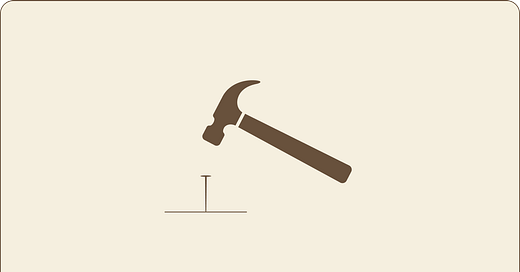“I suppose it is tempting, if the only tool you have is a hammer, to treat everything as if it were a nail.” — Abraham Maslow
Familiarity has a surprising effect on how we solve problems.
Abraham Kaplan provided the first iteration of this bias in the 1960s as the Law of the Instrument: “Give a small boy a hammer, and he will find that everything he encounters needs pounding.” I can personally identify with this statement, as I have vivid memories of doing just that as a boy.
Abraham Maslow followed soon after with his own version known as Maslow’s Hammer. It featured the now famous hammer and nail quote.
Both Kaplan and Maslow were predated by at least a century with the “Birmingham screwdriver,” a little British humor suggesting people from Birmingham used brute force to solve problems. A hammer was used when a screwdriver was needed.
The modern equivalent can be found in every endeavor. A few examples should illustrate the problem:
In software, developers often use a favorite technology or framework to create a system, even if a different one is more appropriate. It all boils down to what the developer is familiar with.
In medicine, some drugs are over-prescribed for conditions more conducive to other drugs or therapies. What appears to be ADHD could be a learning disability exacerbated by chronic anxiety.
In education, new teaching methods tend to expand well beyond their original purpose. Similar to developers, teachers tend to apply the method they are most familiar with, even if another method is more appropriate.
The following practices will aid you in avoiding this common form of bias:
When a professional provides an opinion, seek out at least a few more.
Keep up with new developments in your area of expertise. Engage with other people in your field regularly and share experiences.
Ask other people to provide an objective assessment of your solution to a problem. Constructive criticism can unmask any attempts at brute force.
Observe the behavior of others. Look for the same solution popping up in succession. You may be surprised at the frequency and diversity of such occurrences.
The familiar is comfortable. Don’t let it blind you to the best tool for the job.




